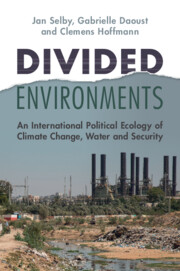2 - Geography versus Demography
Published online by Cambridge University Press: 15 September 2022
Summary
This chapter introduces and develops an initial critique of ‘eco-determinist’ thought on climate, water and environmental security. The chapter shows, against this tradition, that the tension between local geographical constraints and demographic pressures is not the central cause of contemporary water-related insecurities, and that there are good structural reasons for this, rooted in the logics of global capitalism. The chapter demonstrates that eco-determinist thinking is both substantively misleading and normatively questionable. And it argues, on these grounds, that climate change–induced scarcities are in and of themselves unlikely to become a major source of conflict. These arguments are advanced both theoretically and via empirical analysis of, among other things, the patterns of water stress and scarcity across the book's ‘divided environments’, claims about 'water wars' on the Euphrates, Jordan and Nile Rivers and evidence on the current and likely future impacts of climate change on water resources. Overall, the chapter shows that what Robert Kaplan has called a ‘revenge of geography’ is unlikely, even under conditions of accelerating human-induced climate change.
- Type
- Chapter
- Information
- Divided EnvironmentsAn International Political Ecology of Climate Change, Water and Security, pp. 33 - 68Publisher: Cambridge University PressPrint publication year: 2022



